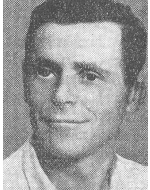Shadiel (Kempel), Yehoshua
Son of Yenta and Moshe-Eliezer was born on August 6, 1913 in the city of Yavorov, in eastern Galicia, Poland. A fifth child among the nine children of the family, one of the enthusiastic Belz Hasidim. Joshua attended a Polish elementary school and school. When his father’s business was undermined in the forests, the family moved to Lvov in 1929 and Yehoshua joined the family in a textile shop. After a year he joined the Bnei Akiva movement and devoted himself to it. In the movement he held the roles of organization and training and made demands on himself and his friends. Even when his father died and much of the burden of supporting the family was imposed on him, did not let go of his work in the movement and his aspiration to immigrate to Israel. For this purpose, he spent a year of training in the “Avraham” group in Kosow, weaving carpets, and after training returned to work in the store in order to save money for immigration expenses. He immigrated to Eretz Israel with members of his movement, including his fiancée, and joined the Avraham group in Pines, where he quickly found work in the orchards and found a permanent job in the village for several years. During the bloody riots of 1936-1939, he was sent to a course for commanders in Pardes Hannah, and when the members of the course went on a tour of Givat Ada they were able to participate in the suppression of a large gang that attacked the small settlement at that time, At the time, he was very enthusiastic about his work, and when the group sent members to specialize in the various branches of agriculture, He returned to the land and was sent to an apprenticeship in the field at Beit Alfa, where he also studied the theoretical aspect of the industry and the driver of a tractor, and returned to his group to lay down a foundation for the cultivation of the ground, thus refusing to interfere with the settlement. He decided to move to another kibbutz, but at last he could not separate from his friends and accepted the majority’s decision, and remained among the latter in the village of Pines until the liquidation of the farming sector. After the birth of their firstborn son, they went with the birds to Kfar Etzion where he managed the chicken coop, improved, expanded, and entertained the hope that the group would also receive flat land and then return to work in the field. He received information about the surviving sisters from the family and two of them helped with their immigration and their arrangement (the arrival of a third sister from Russia was known during the siege). During the War of Independence and the siege of the Etzion Bloc, he also helped when the mothers and children were transferred to Jerusalem. Yehoshua worked on the chicken coop, .. “I tried to warn against illusions, but I decided to be only a soldier, a responsible soldier.” He said, “I tried to warn against illusions.” In another letter, he wrote: “I do not know what the outcome of the campaign will be, and who will win to see the rebirth of the state – but our son will certainly enjoy it.” In the last battles, he held his position with his men while constantly bombarding the enemy’s artillery and mortars, and they returned fire, but in the evening he was forced to inform the headquarters that the enemy had succeeded in uprooting them. On the following day, the day after the fall of Kfar Etzion, on May 13, 1948, he and his men continued to repel the enemy’s assaults until he fell with his friends at noon when the enemy burst into the village. (November 17, 1949) was transferred to eternal rest, with the rest of the spaceAt the military cemetery on Mount Herzl in Jerusalem.
